Behind stories of lottery jackpot winners are thousands who lose what little they have
When a $1.4 billion lottery ticket was sold at a Neptune liquor store last month, the news spread across the Jersey Shore and beyond with the expected celebration that a local had won the enormous prize.
But what didn’t get attention, and rarely does, was the fact that calls to the Council on Compulsive Gambling hotline sharply increased as they always do when a major jackpot is on the line.
Most were also unaware that more lottery retailers operate in low-income areas, that most lottery tickets are purchased by a small group of buyers – many of those gambling addicts – and that one-third of big prize lottery winners eventually declare bankruptcy.
“No one is being informed as to the devastation and the effects if somebody develops an addiction to gambling through lottery tickets,” said Felicia Grondin, executive director of the Council on Compulsive Gambling of New Jersey. “It is a different form of gambling. Most people don’t look at it as gambling.”
More: Mega Millions jackpot winner in Neptune NJ: What we know
Far more people participate in lottery sales than in any other form of gambling – from sports betting to poker slots – according to a 2023 Rutgers Center for Gambling Studies report.
The research indicated that 73% of those who admitted gambling in the past year had purchased lottery tickets, with 59% saying they used scratch-offs. That’s compared to just 20% who visited a casino and 19% who bet on sports.
Experts say the popularity is due in part to the simplicity and ease of buying a lottery ticket, the quick access at local stores and on apps. The marketing of lottery tickets is also different than other kinds of gambling, they contend, because they promise a life-changing outcome.
“In a casino you tend to be selling a social environment, you are with friends. With sports betting you are engaged in the game and interested in the outcome,” said Alan Feldman, a distinguished fellow on responsible gambling at the UNLV International Gaming Institute. “With lotteries, it is pretty much a fantasy.”
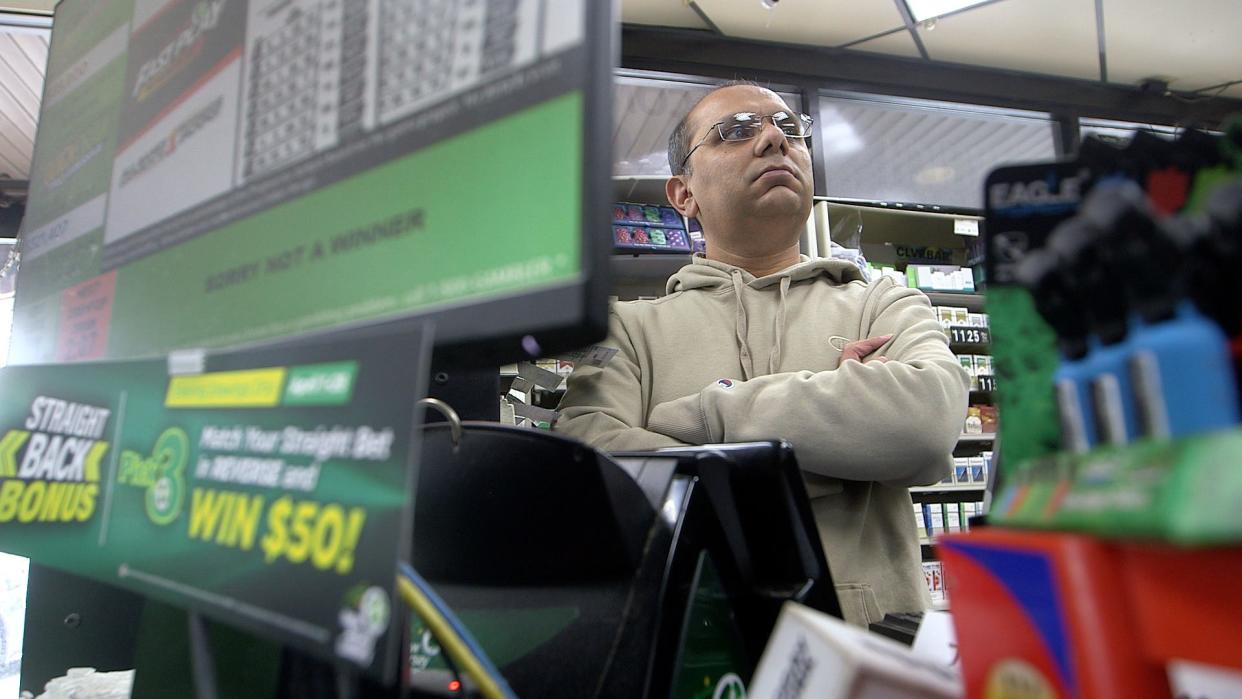
More: New Jersey hit record $3.73 billion in lottery sales last year
NJ defends its approach
Missy Gillespie, chief communications officer for the N.J. Lottery, defended the agency and said no misleading promotions are involved.
“The New Jersey Lottery appeals to Jerseyans of age to play legally and responsibly,” she said via email. “There is no messaging that encourages anyone to purchase more tickets than they can afford to play. A player’s level of play is their choice, and we consistently reinforce messages that remind all players to play responsibly.”
That lottery message, responsible or fantasy, seems to be enough for local players like Lucy Patriarca, one of many customers buying their chances at Jersey Farms Deli and Grill in Brick Township on a recent Thursday morning.
“You’ve got to be in it to win it,” said Patriarca, who put $10 down on the Powerball jackpot, which stood at $1.3 billion that day and was later won by someone in Oregon. “I only play it when it’s big. I never win, but it’s worth a shot.”
Bill Stoney, 85, echoed that view, admitting he spends up to $100 per week on a mix of draw games like Powerball and MegaMillions, as well as scratch-offs, mostly for his wife.
“I just play and I don’t care if we win or lose,” Stoney said. “My wife likes it. It’s just for the fun of it.”
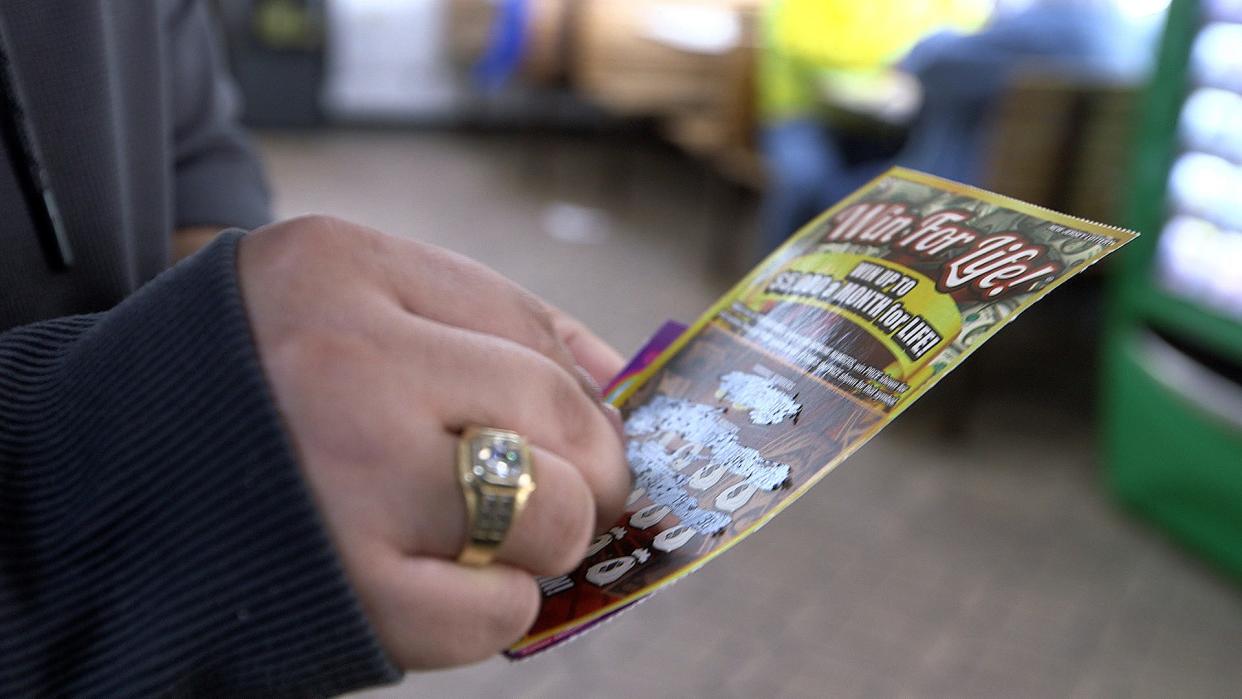
Selling a 'fantasy'
Harry Patel, Jersey Farms co-owner, said about 25% of his lottery customers purchase more than $100 worth of tickets per week, and at least one in 10 spend that much daily.
“About 80% of my customers are regulars and when you have a big jackpot it grows, it is a lot,” Patel said. “We had a big winner in 2022, she won $372,000 on Jersey Cash 5. She’s still a regular, she still plays.”
Arnie Wexler, a Bradley Beach compulsive gambler in recovery and founder of the Council on Compulsive Gambling, said promoting that fantasy prize is among the most misleading schemes because the multimillion-dollar jackpots are nearly impossible to win and play on an addict’s weaknesses.
“People see that and they say it could be me,” Wexler said. “It is the state’s way of sucking money from the public by using the dream of everybody that ‘this week I’m going to win the lottery.’”
Experts say such an approach violates the American Gaming Association’s Code of Conduct, which states gambling-related ads must not “contain claims or representations that gambling activity will guarantee an individual’s social, financial or personal success.”
More: What financial planning should the NJ Mega Millions lottery winner be doing right now?
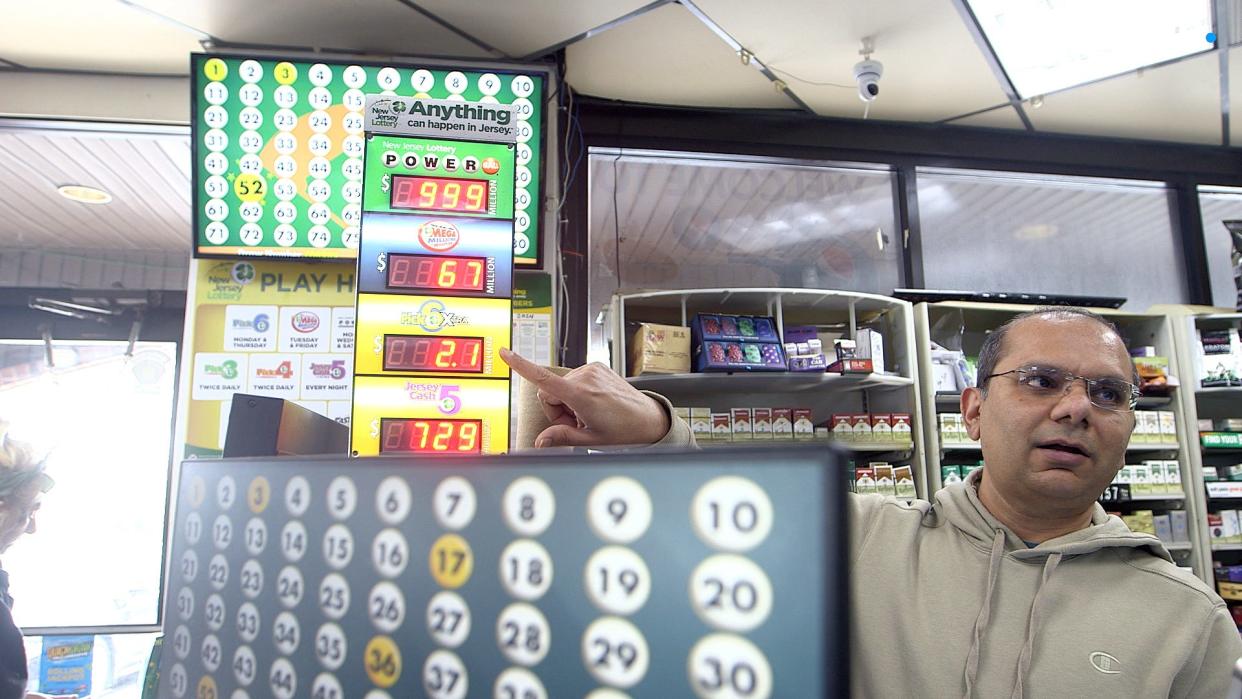
Recent New Jersey Lottery ads that proclaim, “Anything can happen in New Jersey” and “Make your dreams come true” walk a fine line with that basic code, critics say.
“The advertising glamorizes gambling, there is nothing around that shows the public the dark side of it,” said Grondin.
Gillespie disagreed.
“The New Jersey Lottery is entertainment with a purpose,” she said via email. “Players understand the odds for jackpot games are very high and all odds are available.”
Gillespie noted that Garden State lottery players took home $2.23 billion in prizes in 2023, with more than 200 players winning $100,000 or more, including 58 players who received prizes of $1 million or higher.
The odds are the worst of all gambling options, near 1 in 292.2 million for Powerball and about 1 in 302.6 million for MegaMillions, according to experts.
“Chances of winning the lottery are the same as being struck by lightning 12 times,” Wexler said. “They suck more people in the bigger the jackpot. That is the issue and they know it will work.”
And it’s the poorest and often most vulnerable who are targeted for lottery games, data indicates.
Target customers?
A 2022 study by the Howard Center for Investigative Journalism found that “stores in the vast majority of states that sell lottery tickets are disproportionately concentrated in communities with lower levels of education, lower levels of income and higher poverty rates, with larger populations of Black people and Hispanic people.”
More: Two biggest NJ lottery wins in 2023 came from Jersey Shore
New Jersey is no different.
A 2018 analysis by Gannett New Jersey found that two-thirds of lottery sales come from the state's poorest communities, those where the median household income is less than $81,800, according to the U.S. Census Bureau.
Stores in the poorest 10 percent of New Jersey neighborhoods, where the median income is less than $51,900, sell 26 percent of the lottery tickets in the state.
The wealthiest 10 percent, where the median income is more than $131,700, contribute only 3% of lottery sales.
“Look at where they concentrate the lottery outlets,” said Les Bernal, national director of Stop Predatory Gambling, a nonprofit involved in gambling education. “On every street corner in low-income communities they are selling $30 of scratch-offs, that is where the lottery outlets are concentrated. There is no question this preys upon low-income people.”
Gillespie said the lottery does not determine where its outlets are placed, simply responding to those that seek to provide them in their retail locations.
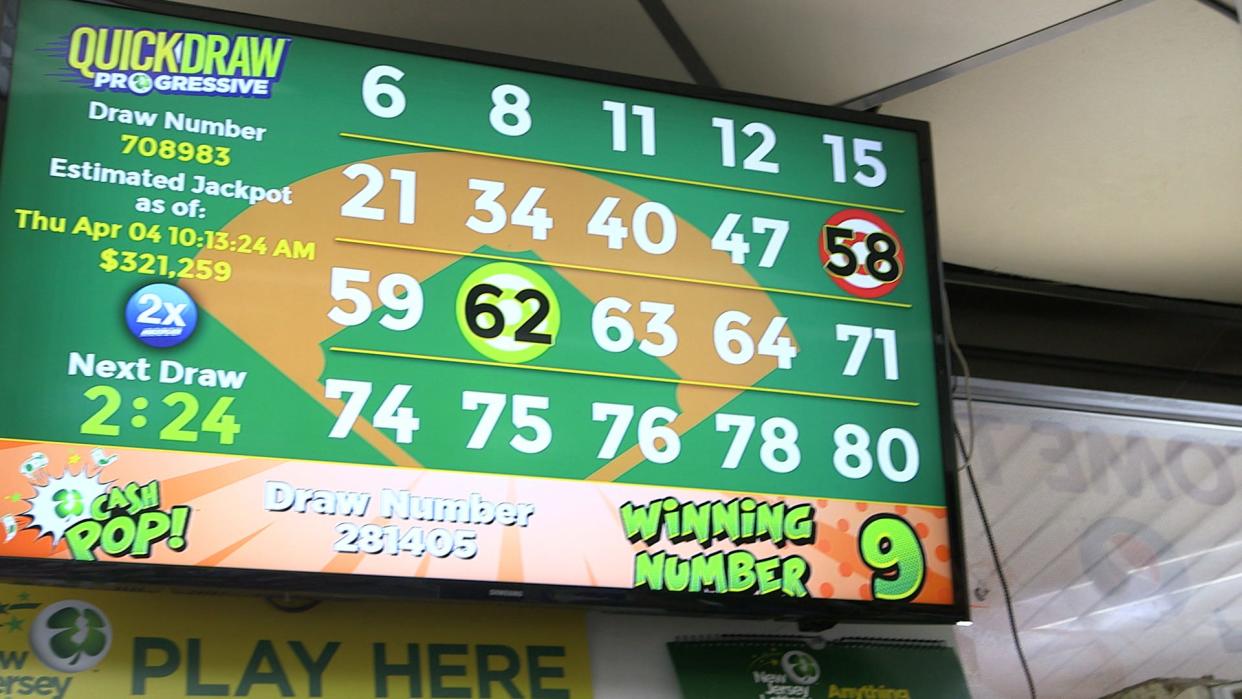
More: New Jersey lottery sells the most in the state's poorest neighborhoods
“The New Jersey Lottery grants retailer licenses to any retail business that expresses interest in selling our products as long as they meet the application criteria,” she said. “Places like Newark, Jersey City, and Hoboken will appear to have more retailers because they are in densely populated cities. New Jersey Lottery does not discriminate either for or against any retailer based on their race, gender, ethnicity, lifestyle or location and we do not target specific locations for licenses.”
Beginnings and beneficiaries
New Jersey state lottery dates back to 1969 when voters approved a measure to legalize the chance tickets, with an 81.5% majority. The first ticket was sold on Dec. 16, 1970, to then-Gov. William T. Cahill. (He lost re-election three years later after an illegal contribution scandal sent his former campaign finance chairman to jail.)
The state lottery paid its first $1 million prize in 1981 and reached its first $1 billion cumulative sales in 1986.
In 2023, the lottery reached its highest revenue total ever with $3.73 billion in sales, a 2.55% increase over 2022. Nearly 60% of those sales were from scratch-off tickets, which remain far and away the most popular.
Most of the money raised goes to the cash prizes, about $2.2 billion, with more than $1.5 billion in operating expenses, including more than $21 million to Northstar New Jersey, which manages the lottery.
Initially, the lottery’s profits – which top more than $1 billion annually – were slated for state education funds. But in 2017, under Gov. Chris Christie, the law was changed to help shore up the dwindling public employee pension fund for state workers such as police, firefighters and teachers.
Most of the proceeds, 77.78%, go to the Teachers’ Pension and Annuity Fund, according to Gillespie. She said the remaining 21.02% go to the Public Employees Retirement System (PERS), with the last 1.2% for the Police and Firemen’s Retirement System.
The state is also spending more than ever on advertising the chance games, with $27.9 million spent annually promoting the lottery in recent years. That’s a sharp increase from 10 years ago when only $16 million went toward advertising.
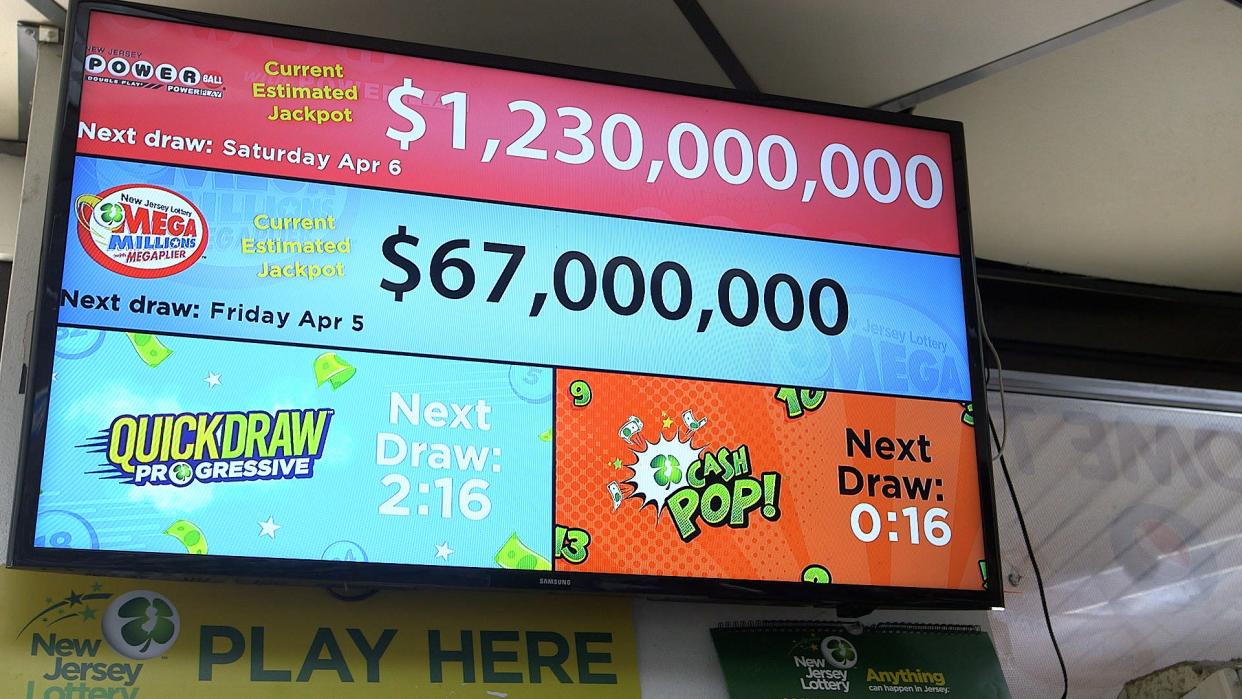
Publicity exacerbates problem
But advertising is only a small part of the message that drives lottery interest and sales, according to observers who point to media outlets that continue to report on growing jackpots and winners more often than those who suffer from the games.
“The media are absolutely a part of the system of promoting these games,” Feldman of UNLV said. “The media plays a significant role because the higher the jackpot, the higher the coverage and its promotion.”
Media ethics experts agree.
More: Powerball, Mega Millions winners can remain private in these 10 states
“You’re always supposed to be balanced and many of these stories are not balanced, they don’t point out the possible negatives and the possible harm,” said Kathryn Quigley, chair of the journalism department at Rowan University in Glassboro and a media ethics instructor. “News organizations could and should do a better job of writing a more balanced story when writing about large jackpots.”
Chris Roberts, vice-chair of the Society of Professional Journalists Ethics Committee, echoed that view.
“When the jackpot is a billion dollars, it is news,” Roberts said. “But it is about truth and balance, covering all sides is something that’s simpl,e yet as complicated and as ripe with implications as a lottery.”
Back at Jersey Farms, players say they will continue to try their luck, despite the odds.
“The possibility becomes if I ever win, I’ll be happy,” said Ed Shannon, 79, who says his father was a gambler but never came out ahead. “He was broke.”
Joe Strupp is an award-winning journalist with 30 years’ experience who covers education and several local communities for APP.com and the Asbury Park Press. He is also the author of three books, including Killing Journalism on the state of the news media, and an adjunct media professor at Rutgers University and Fairleigh Dickinson University. Reach him at jstrupp@gannettnj.com and at 732-413-3840. Follow him on Twitter at @joestrupp
This article originally appeared on Asbury Park Press: Why the lottery is the most popular, but worst bet you can make
